Fish meal international trading involves the buying and selling of a high-protein powder made from fish that are not suitable for human consumption, such as anchovy, herring, and menhaden. The trade of fish meal is a significant industry, with major producers including Peru, China, and Chile.
The international trade of fish meals is driven by the demand for animal feed, particularly for aquaculture and livestock industries. The industry is subject to fluctuations in supply and demand, changes in market prices, and regulatory requirements such as sustainability standards and product quality requirements.
The trade involves a complex network of suppliers, manufacturers, and distributors, who work together to ensure the supply and demand of fish meals is met. Trading can occur via physical delivery or through financial instruments such as futures contracts and options.
The industry faces challenges, such as overfishing and environmental concerns regarding the impact of fishing practices on marine ecosystems. However, the use of fish meals is an important component of the global economy, providing a valuable source of nutrition for animals and supporting the growth of various industries.
Overall, fish meal international trading plays an important role in the global economy, providing a vital resource for the production of animal feed while also supporting the livelihoods of many workers in the fishing industry.





